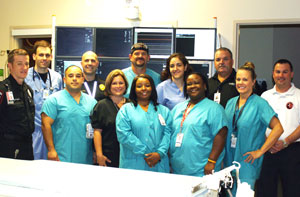
The total time from when a patient arrives at a hospital until the artery is reopened is called “door to balloon” time. Memorial Hermann Northeast Hospital recently performed the lifesaving treatment in just 14 minutes.
“Patients are taken directly to the Cardiac Catheterization Lab, after rapid evaluation in the Emergency Room, so blood flow to the heart can be restored quickly,” said James ‘Bubba’ Campbell, R.N., Emergency Center clinical coordinator and Chest Pain Center coordinator. “Reducing the door to balloon time lowers a patient’s risk of death and serious damage to the heart muscle.”
Each year, an estimated 400,000 to 500,000 patients have the most serious kind of heart attack, called a “STEMI” (myocardial infarction with St-segment elevation), caused by a prolonged decrease in blood supply due to a blocked artery. Unless the blockage is quickly removed, that part of the heart muscle dies.
“We advise people to call 911 or get to a hospital immediately if they experience chest pressure or pain in the center of their chest,” said Emergency Center Director David Beck. “Especially if it is accompanied by pain or discomfort in one or both arms, back, neck, jaw, or stomach. Other symptoms to watch for include shortness of breath, sweating, nausea, and lightheadedness.”
The average door to balloon time at Memorial Hermann Northeast is 59.5 minutes. The American College of Cardiology and the American Heart Association have developed national hospital guidelines calling for less than 90 minutes.
In another case, a patient was transported to Memorial Hermann Northeast by Harris County Emergency Corps. The total time elapsed from initial patient contact by EMS to angioplasty was only 35 minutes.
“Cardiologists always say ‘Time is Muscle.’ Every minute matters when a patient is having a heart attack,” said Armita Atashband, MD, an interventional cardiologist affiliated with Memorial Hermann Northeast. “Swift treatment is important to improve a patient’s chance of survival and minimize damage to the heart by quickly restoring blood flow to the heart.”
A leader in quality and patient safety, Memorial Hermann Northeast has been accredited as a Certified Chest Pain Center by the Society of Chest Pain Centers. The hospital is also recognized by the American Heart Association and the American Stroke Association as a Gold Plus Stroke Facility, designated as a Primary Stroke Center by the Southwest Texas Regional Advisory Council, and distinguished as a Top Performer on key quality measures by The Joint Commission.